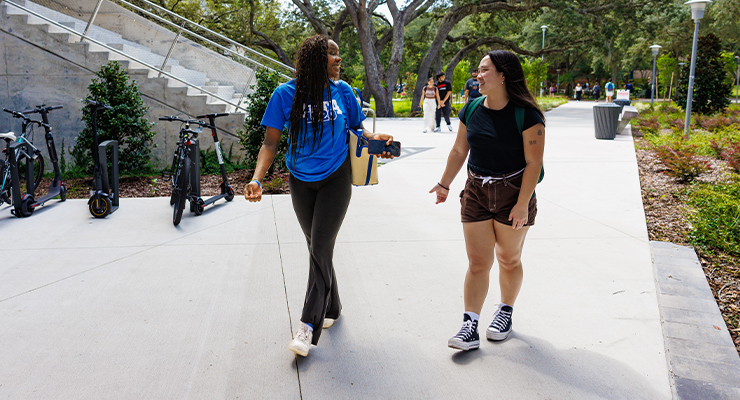
By nature, humans are social beings, with a desire for companionship built into each and every one of us. We need friendship and studies show that those friends help keep us healthy. In college, the connections you make are just as important as your academic standing. Establishing a sense of community will not only fulfill your college experience but also offer the support and comfort you need to sustain you throughout college.
Navigating through college, your newfound independence, and new responsibilities can be overwhelming and difficult, but you don’t have to experience it alone. Here is some insight into how to make friends in college.
Talk to people when you’re on campus.
It is not as easy to make friends if you don’t speak. For introverts, this doesn’t require you to temporarily take on the personality of an extrovert. You can still meet people if you’re more reserved—it just may take some other strategies to build those relationships. Interacting with others can be simple but you need to be consistent. Here are two simple ways to spark conversation.
Use your classes to your advantage.
In college, most of your time is spent in your classes, where you are surrounded by students who are learning the same course material as you. It’s an automatic icebreaker. Introduce yourself to those who sit next to you and ask them about the coursework or how they like the class.
Of course, this will not instantly make you and your classmates besties, but with consistency, your conversations may evolve into something other than discussions about the class and assignments. When you're comfortable, you can form a study group, setting aside time outside of class for you and your classmates to study and do assignments together.
Compliment someone.
Who doesn’t love being complimented? It is a simple yet effective method to start a conversation and uplift others. If there is anything you admire about someone, whether it’s a clothing item or accessory they’re wearing, take a moment and compliment them. Additionally, ask questions about where they got something, or got something done, and in their responses, you can potentially pick up on interests you both may share and allow the conversation to build off those interests.
Don’t hide in your room!
Spend some time outside of your own space and allow others the pleasure of meeting you. Come out of hiding and place yourself in settings where you can easily interact with others. Here are some ways to do so.

Join clubs and organizations.
There are a slew of student clubs and organizations on college campuses. At USF, we have more than 700 clubs and organizations for students to join. Exploring clubs where your cares and interests lie is the most subtle way to find others with the same enthusiasm for the things you like. You can use common interests to spark conversation.
Go to school events.
Colleges and student organizations are always hosting events on campus like academic discussions, sporting events, and parties. Keep an eye out on campus, on social media, or on your college’s events platform to find events that you might enjoy. Attending these events gives you a chance to meet and engage with other students in attendance.
Be willing to try new things.
Get out of your comfort zone and do activities you wouldn’t normally do. This will be an easy way to meet people you likely wouldn’t see in your regular day-to-day routine. It could be anything from taking a visit to your campus recreational center to taking an art class. Trying new activities could also lead to the development of new skills or a new hobby, which would also expand the number of people who might share your new interests. You never know, you and your new friend might be the next pickleball champions at your school!
How to nurture your college friendships
The amount of effort you put into making your friends is equally as important in maintaining those friendships. In college especially, it may be challenging to continuously build your relationships outside of the classroom or the club meetings. Here are some ways to nurture your friendships and get to a deeper level.
Stay connected with people.
When you meet someone, be sure to establish a form of contact outside of your regular setting. Exchange phone numbers or follow them on social media, so there is a way to keep in touch and stay connected even if you don’t see them frequently. Plus, if they share something on their Instagram story that you’re interested in, it’s another way to keep the conversations going.

Plan activities like lunch or a movie night.
Quality time is the perfect way to develop your relationship with someone. Friendships cannot happen overnight, and they cannot solely live off brief interactions. Set aside a time and invite your friend to hang out. Whether it is to grab lunch, or catch a movie, spending time with your friends is a great way to establish a strong relationship.
Be vulnerable.
Vulnerability is imperative to fostering a deeper connection with your friend. Give your friend a chance to get to know you beyond the surface level—doing this also gives your friend the space to do the same. Vulnerability helps transform acquaintanceships into friendships. In college, you will face a lot of unprecedented changes and feelings, many of which your classmates can fully understand. So, don’t be afraid to be vulnerable because it isn’t a sign of weakness but of trust and strength.
Don’t be afraid to be yourself.
In the process of making friends, you may place a lot of focus on others’ perceptions of you. That is normal, but it is important to separate your worth from the opinions of others. Stay true to who you are because there is only one you. It’s not sustainable to act like someone you are not for a long period of time and others will eventually be able to tell when you are not being yourself.
Yes, sharing is an important aspect of friendship but having different experiences, perspectives, thoughts, and interests is part of what makes friendships so beautiful. So, don’t put so much pressure on yourself to change—you can only find friends who love and support you for who you are if you truly are being yourself.
Want to meet new people, but aren’t sure where to start?
At USF, we’re here to help students succeed in all aspects of university life—not just academically. If you’re stuck on ways to make new friends or connect with others, please reach out to our counseling center or contact New Student Connections.


